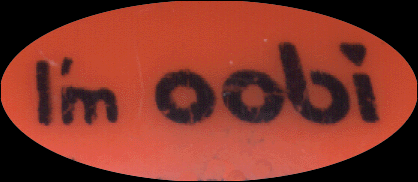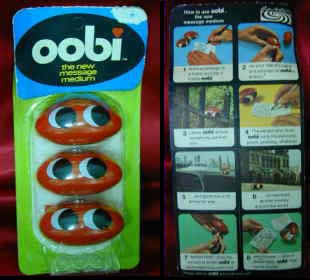
|

|
|
|

I'm pretty sure that once upon a time in the late 60s there existed these little plastic reddish-orange spheroids called "Oobi." An Oobi was about 3-4" long with big eyes painted on one side and a slit in the top. There were address lines on them and you were supposed to put a message or letter inside, address Oobi and then just abandon it somewhere, hoping other kind hippie-ish souls would carry Oobi gradually towards its destination. The commercial for the thing showed someone leaving one on a fence post, another person picking it up and taking off on a bike or something, another person, and so on. (What optimists they were back in the 60s.) The search went on for a long time. Finally, Deuce of Clubs pal Ultima Thule spotted a set of oobis on eBay. oobis on eBay. Fun to say. Try it! Ultima didn't win the auction, but she did snag a scan for me. So, my sister and I were not victims of some shared nightmare -- Oobis actually existed. Turns out that Oobi had not been a Wham-O product, but a Parker Brothers product -- in fact, their most colossal failure ever, as I was informed by the guy who beat out Ultima in the eBay auction:
According to a 1973 Parker publication, 90 Years of Fun 1883-1973:.
Update, 27jul2007: Someone had a long peek at 90 Years of Fun, as is evident in The Game Makers (p. 162):
Nerf began life as an indoor volleyball game. Its inventors proposed that it be played while sitting cross-legged on the floor. It was one of the first new games seen by urbane Bill Dohrmann, a Princeton graduate and recent Parker Brothers recruit who had taken Hank Simmons's place as head of R&D. . . .
Dohrmann's record wasn't flawless, however. Among the most unusual products he sponsored was a novelty called Oobi. Oobi wasn't a game and it wasn't a puzzle. It wasn't "sliced goods" or a craft or a toy or a fortune-telling device. Oobi was a message carrier. It was reddish orange in color, egg-shaped and hollow, and fit in the palm of your hand. Its only decoration was two big eyes looking up at whoever was holding it. Three Oobi message carriers were packed on a card that hung on a rack at retail. The back of the card explained Oobi's purpose and how to use it: "I contain a message to another human being. Please further my journey an inch, a foot, or a mile. Add a note if you wish. Then help me to the next nice person, like yourself."
Dohrmann believed that Oobi could be a word-of-mouth blockbuster, with sales exceeding Ouija's. During its development in 1970, Oobi was referred to as "Project O" in the unlikely event a competitor got wind of it and rushed a similar product to market. In 1971, Oobi was test-marketed on the West Coast with a television commercial that stated "Oobi means love." However, the West Coast public did not take a liking to Oobi. Another test market was conducted in the Southeast. Same result. Parker Brothers "got the message" and Oobi joined the junk heap of toy history.
A note on the above adds further period color: "One of the annoying uses for Oobi was the passing of one to a female flight attendant ("stewardess" then) by a male airline passenger." Update, 26jun2008: Further hot Oobi-stewardess aktion! from Ellen Wojahn's The General Mills/Parker Brothers Merger: Playing by Different Rules (p. 51):
Dohrmann quickly became like every R & D man in the business—he came to believe in his own talent as a judge of product. His gut instincts were as good as anybody else's—which weren't always good enough. Anyway. Three months and a week after the lost eBay auction. . . . |

 "Oobi, a red, egg-shaped hollow message container, holds the distinction
of being Parker Brothers' wildest failure. Printed on it was: 'I contain a
message to another human being. Please further my journey an inch, a foot
or a mile. Add a note, if you wish. Then help me to the next nice person
like yourself.' To prevent competitors from stealing the idea,
intra-office communications were coded, 'Project 0' The advertising
campaign, introduced in early 1971 with an artistic and beautiful
television commercial, was 'Oobi means love.' Parker Brothers soon got the
message. The public hated Oobi. Thinking that perhaps the West Coast test
failed because they weren't quite ready for Oobi, the test-market was
switched to the Southeast, where it also failed miserably. End of Message
Carrier."
"Oobi, a red, egg-shaped hollow message container, holds the distinction
of being Parker Brothers' wildest failure. Printed on it was: 'I contain a
message to another human being. Please further my journey an inch, a foot
or a mile. Add a note, if you wish. Then help me to the next nice person
like yourself.' To prevent competitors from stealing the idea,
intra-office communications were coded, 'Project 0' The advertising
campaign, introduced in early 1971 with an artistic and beautiful
television commercial, was 'Oobi means love.' Parker Brothers soon got the
message. The public hated Oobi. Thinking that perhaps the West Coast test
failed because they weren't quite ready for Oobi, the test-market was
switched to the Southeast, where it also failed miserably. End of Message
Carrier."